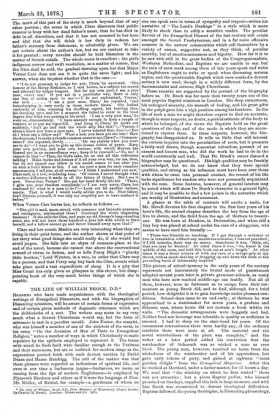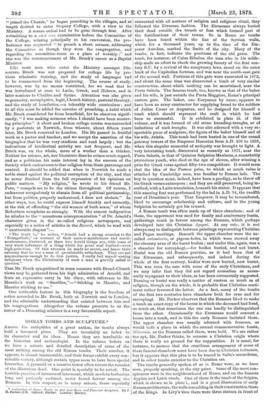THE LIFE OF WILLIAM BROCK, D.D.
READERS who have made acquaintance with the theological writings of Evangelical Dissenters, and with the biographies of Dissenting ministers, will be aware of certain forma of expression and of certain pious methods of dogmatic utterance which are the shibboleths of a sect. The writers may mean to say very much what a devout Churchman would say, but the form of utterance is cast in a peculiar mould. John Foster, the essayist, who was himself a member of one of the strictest of the sects, in his essay " On the Aversion of Men of Taste to Evangelical Religion," notes a number of ways in which Christianity is made repulsive by the epithets employed to represent it. The terms with which he finds fault were familiar enough to the Puritans and their successors, but are as unfitted for modern usage as the expressions poured forth with such devout unction by David Deans and Manse Headrigg. The evil of the matter was that these phrases were regarded as indications of spiritual life, and even in our time a barbarous jargon—barbarous, we mean, as coming from the lips of modern Englishmen—is employed by Plymouth Brethren and others as if it were the language of Zion. Mr. Muller, of Bristol, for example—a gentleman of whom no • The Life of William Brock, D.B., First Minister of Bloomsbury By Charles M. Erroll. London : Nisbet and Co. 1878.
Chapel, London.
one can speak save in terms of sympathy and respect—writes his narrative of "The Lord's Dealings" in a style which is more likely to shock than to edify a sensitive reader. The peculiar flavour of the Evangelical Dissent of the last century still exists amongst the Scotch Presbyterians, and in a far more offensive measure in the narrow communities which call themselves by a variety of names, suggestive not, as they think, of peculiar sanctity, but of sanctimoniousness and bigotry. How far it is to be met with still in the great bodies of the Congregationalists, Wesleyan Methodists, and Baptists we are unable to say, but the men of moat mark among them of late years speak and write as Englishmen ought to write or speak when discussing serious topics, and the questionable English which once marked a devout sectary is now used, though in a widely different form, by the Sacramentalist and extreme High Churchman.
These remarks are suggested by the perusal of the biography before us. Dr. Brock was for more than twenty years one of the most popular Baptist ministers in London. His deep earnestness, his unfeigned sincerity, his warmth of feeling, and his great gifts in the pulpit gave him a high position among his brethren. In the life of such a man we might therefore expect to find an accurate, though in some respects, no doubt, a partial estimate of the body to which he belonged, of the views the Baptists hold on the great questions of the day, and of the mode in which they are accus- tomed to express them. In these respects, however, the bio- graphy has disappointed us. It tells us little that will interest the curious inquirer into the peculiarities of sects, but it presents a fairly-well drawn, though somewhat colourless, portrait of an earnest and honest man, who did the work he had to do in the world consistently and well. That Dr. Brock's career claimed a biographer may be questioned. His high qualities may be frankly acknowledged, but we do not know that they were special qualities, and strong as his influence must have been over those with whom he came into personal contact, the record of his life lacks significance for readers who were not personally acquainted with the man. Some features, however, of general interest may be noted which will show Dr. Brock's character in a general light, and it may be possible to find a few points in the narrative which are worthy of illustration and comment.
A glance at the table of contents will excite a smile, for Mr. Birrell devotes his first chapter to the first four years of his hero's life, the second chapter describes the boy from the age of five to eleven, and the third from the age of thirteen to twenty- one. He was born at Honiton, in Devonshire, and when still a tiny boy was placed at school under the care of a clergyman, who seems to have used him brutally :—
" There was literally no teaching. If I got through a sentence or two in translation without any monstrous mistakes, I was not punished ; if I did mistake, there was no mercy. Sometimes it was, ' Strip, sir, that you may be birched.' At other times it was, Go, kneel in the middle of the room, and hold this book out at arm's length.' At other times it was a fierce seizure of both my ears, or a savage grip at my throat, with as much shaking or dragging up and down the room as the prevailing burst of inhumanity inspired."
This picture of school-tyranny in the early years of the century represents not inaccurately the brutal mode of punishment adopted several years later in private grammar-schools, as many men who have now reached middle-age can testify. Not all of them, however, were so fortunate as to escape from their tor- mentors as young Brock did, and to find, although for a brief period, how delightful it is to gain knowledge under pleasant con- ditions. School-days came to an end early ; at thirteen he was apprenticed to a watchmaker for seven years, a profane and illiterate man, whose house did not contain a book within its walls. " The domestic arrangements were beggarly and bad.
Neither food nor beverage was tolerable in quality or sufficient in amount. I had to sleep on the stair-head for years. Of the commonest conveniences there were hardly any, of the ordinary comforts there were none at all. The material and the moral wretchedness of the place was complete," and the writer at a later period added his conviction that the watchmaker of Sidmouth was as wicked a man as ever lived. The young man, however, received no harm from the wickedness of the watchmaker and of his apprentices, but
gave early tokens of piety, and gained at eighteen " most genuine delight" from the Evangelical Magazine. After this he worked at Hertford, under a better master, for 13 hours a day. We read that " the ministry on which he first waited " there was not attractive ; but a pious Baptist pedlar, who himself preached on Sundays, supplied this lack in large measure, and with Baptism followed, the young theologian, in Dissenting phraseology, Ihim Brock was accustomed to discuss theological difficulties.
" joined the Church," he began preaching in the villages, and at length desired to enter Stepney College, with a view to the Ministry. A severe ordeal had to be gone through first. After
submitting to a viva voce examination before the Committee of the College, relating principally to his conversion, the pro- bationer was requested " to preach a short sermon, addressing
the Committee as though they were the congregation, and regarding the committee-room as a place of worship ;" and this was the commencement of Mr. Brock's career as a Baptist Minister.
Like most men who enter the Ministry amongst Dis-
senters, Brock was not prepared for college life by pre- vious scholastic training, and the study of languages had to be commenced from the beginning. The course of study, however, was by no means restricted, for we read that he was introduced at once to Latin, Greek, and Hebrew, and in later sessions to Chaldee and Syriac. Attention was also given to geometry, metaphysics, logic, Church history, pastoral theology, and the study of homiletics,—a tolerably wide curriculum ; and to all this must be added the exercise of preaching, a habit which Mr. Brock considered far from beneficial, for he observes signifi- cantly, " I was making sermons when I should have been master- ing principles." A short and broken college course was succeeded by a pastorate at Norwich, from whence, about fifteen years later, Mr. Brock removed to London. His life passed in fruitful work as a pastor and teacher, and we accept the assertion of the
biographer that he was very studious and read largely ; but the indications of intellectual activity are not frequent, and Mr.
Brock was, on the whole, more of a worker than a thinker. Neither for science, art, nor literature does he evince much regard, and as a politician his main interest lay in the success of the Society which endeavours to free religion from State patronage and control. It should be added that when in Norwich he made a noble stand against the political corruption of the city, and that he never flinched from the full expression of his opinions on public matters. " My religion," he wrote to his friend Mr. Peto, " compels me to be the citizen throughout. Of course, I endeavour scrupulously to abstain from all political partisanship, but from politics, properly understood, I dare not abstain." In other ways, too, he could express himself frankly and earnestly, at the risk of offending "the old women of both sexes," of whom Robertson complains so strongly. With the utmost indignation he alludes to the " monstrous misrepresentation " of Dr. Arnold's character given in the so-called religions newspapers, and especially to a series of articles in the Record, which he read with " unutterable disgust ":—
" The truth is," ho writes, "Arnold had a strong aversion to the Evangelicals,' on account of their narrow-mindedness and sancti- moniousness, tinctured, as these two horrid things are, with some of very worst influences of a thing which his great soul loathed—even high-priestism. Of this aversion he made no secret, and hence their calumny that he was a man of questionable orthodoxy. They are not magnanimous enough to do him justice. I really feel myself waxing indignant when the Christianity of such a man is gravely called in question."
That Mr. Brock sympathised in some measure with Broad-Church views may be gathered from his high admiration of Arnold, and from an expressive entry in his diary, with reference to Mr. Maurice's work on " Sacrifice,"—" Sticking to Maurice, and Maurice sticking to me."
One noticeable feature in this biography is the freedom of action accorded to Mr. Brock, both at Norwich and in London, and the admirable understanding that existed between him and his congregations. Altogether the volume presents to us the career of a Dissenting minister in a very favourable aspect.



































 Previous page
Previous page